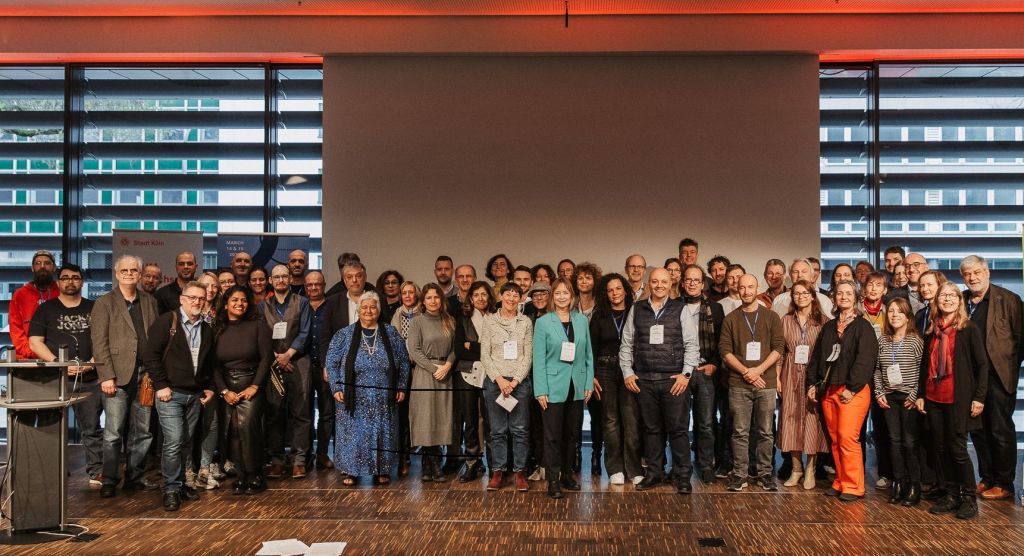

WP5 leaders from BZgA attend EUCOMS network meeting in Cologne/Germany on 14th/15th March 2024
The seminar of the European Community based Mental Health Service Providers (EUCOMS) network dedicated to “Municipal Responsibility for Community Mental Health” was held in Cologne, Germany, on 14th/15th of March 2024 on the occasion of the EUCOMS network meeting. Dr. René Keet, Director of Community Mental Health Service Noord-Holland-Noord in the Netherlands and Chair of the EUCOMS Network represents EUCOMS as a member of the Stakeholder Forum of the JA ImpleMENTAL
The event that was organized in collaboration with the city of Cologne brought together experts, professionals, and advocates in the field of mental health that are part of the EUCOMS network as well as invited guests and interested parties from diverse European countries. The seminar was attended by the WP5 leading team from the Federal Centre for Health Education (BZgA) who got the chance to network with professionals across Europe, discuss with experts about ongoing developments in the German health, psychiatric and social system and learn about initiatives in community-mental health in other parts of Europe.
The seminar addressed the roles and relations of municipalities, non-profit organizations and other stakeholders in the provision of mental health services within the complex and fragmented health and social system in Germany. In particular, the event provided insights into the place of community-based mental health care in a still predominantly hospital-based care system as well as into the role of the “social-psychiatric services” of the municipal health authority of Cologne within the German system and in the federal state of Northrhine-Westphalia.
Social-psychiatric services in Germany provide low-threshold support and counselling services usually for persons with severe acute or chronic mental disorders of their respective catchment area and can be used for free by people in need. They take over a guiding or pilot function for their clients, offering a person-centered approach of tailor-made integrated services with the goal of supporting people with mental illnesses to live an independent and self-determined life in the community. Services are usually provided by multidisciplinary teams of medical professions and social workers within a local (often informal) network of various providers of care and support. Services offered can include counselling and support by persons with lived experience/peers.
Social-psychiatric services are very different in size and services provided, therefore there is a huge variety in forms of organization and services offered across the country, within the 16 German federal states and even within municipal districts. The services currently operate in an increasingly challenging context with a lack of qualified mental health professionals, rising ethno-cultural diversity and sensitivity, growing housing shortage and homelessness, increasing support needs among young people and the need to further develop and establish peer support/work in mental health care. Besides this, the social-psychiatric services in the city of Cologne are currently in the process of setting up and being integrated into a newly created “Community Psychiatric Association” (Gemeindepsychiatrischer Verbund – GPV) for the municipality. The GPV is a formalized and binding association of mental health service providers in a defined care region (i.e. primarily providers of outpatient and inpatient care and integration assistance) with the commitment to develop and provide comprehensive and coordinated care and support for the citizens in the defined area, with a focus on people with severe mental illnesses and/or complex needs. The creation of a GPV generally requires at least a formal committee responsible for steering and coordinating cooperation between the involved organizations at network level and a specific body in which decisions about assistance in individual cases are made in joint collaboration of relevant stakeholders/providers (“individual plan conferences”).
A main part and a highlight of the first seminar day was the possibility offered to participants to undertake site visits of the social-psychiatric centres (Sozialpsychiatrische Zentren – SPZ) in the nine districts of the city of Cologne and neighbouring municipalities. This also included the visit of the vocational center (Berufliches Trainingszentrum – BTZ) of Cologne, a non-profit organization for the vocational rehabilitation of people with mental illness. Small groups of seminar participants thus had the opportunity to visit the premises of the hosting institutions and exchange with staff and experts about the focus, organization and services of each site.
A focus of the second seminar day was on (other) European initiatives and examples of community-based mental health service provision. The attendees had the opportunity to listen to presentations and engage into discussions about the “Clubhouse Model” of peer support services in Amsterdam/Netherlands, the role of social economy actors in work inclusion of persons with mental conditions in different parts of Europe as well as human rights and community mental health services in the Ukrainian context of transformation of “social care homes” and current war.
The programme of the two seminar days also entailed interventions of persons with lived experience and representatives of user organizations in the German context and contributions from the audience devoted specific attention to developments of peer support services and involvement of peer expertise in mental health service provision in European countries.
More information about the programme of the EUCOMS seminar are available on the EUCOMS website under: https://eucoms.net/eucoms-network-meetings/#1685693287477-6da2e9b9-9eec
#JAImpleMENTAL

Funded by the European Union. Views and opinions expressed are however those of the author(s) only and do not necessarily reflect those of the European Union or the European Health and Digital Executive Agency (HADEA). Neither the European Union nor granted authority can be held responsible for them.